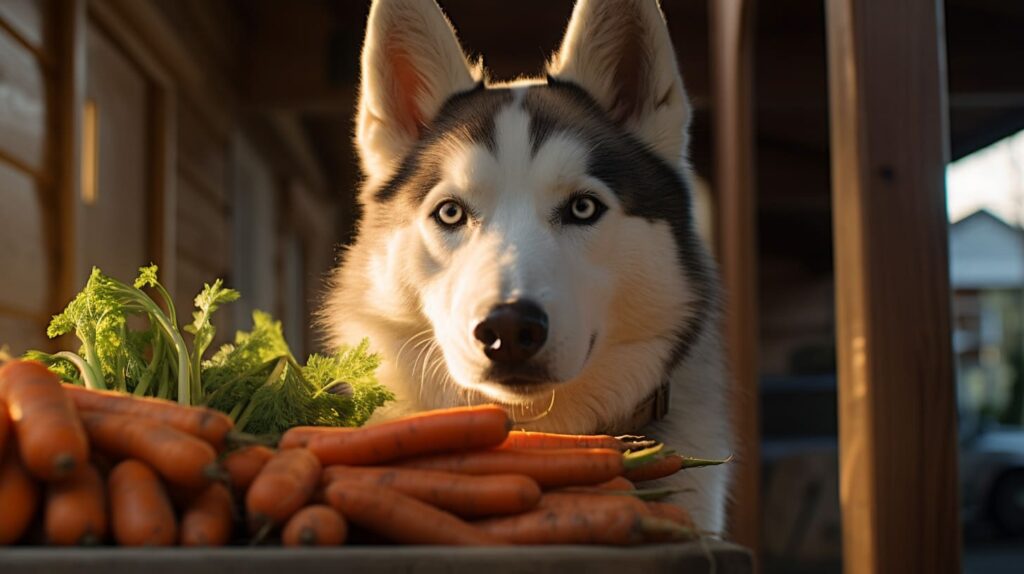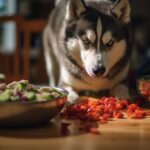If you’re a proud Husky parent, you know that these dogs are not just pets, they’re family. And like any family member, you want to ensure they’re eating a balanced, nutritious diet. But here’s the thing: Huskies are not your average dogs. They’re a breed that’s been conditioned by centuries of surviving in harsh Arctic conditions, and their dietary needs reflect that. So, what’s a Husky parent to do when it comes to feeding their furry friend? Can they eat vegetables? If so, which ones? And how should they be incorporated into their diet? Let’s dig in and find out.
Understanding a Husky’s Dietary Needs
Huskies are known for their stunning blue eyes, thick fur coats, and seemingly boundless energy. But beneath that fluffy exterior lies a metabolism that’s been fine-tuned for efficiency. Huskies are built to survive on less food than most other breeds, thanks to their Arctic origins. This doesn’t mean they should be underfed, but it does mean their diet needs to be carefully managed to avoid obesity.
Huskies are primarily carnivores, and their diet should be predominantly meat-based. However, they can also benefit from certain fruits and vegetables, which can provide essential vitamins, minerals, and fiber. But not all veggies are created equal, and some can even be harmful to Huskies. So, it’s crucial to know which ones are safe and beneficial for your Husky.
Safe Vegetables for Huskies: A Comprehensive List
So, which vegetables get the green light for Huskies? Here’s a comprehensive list:
- Carrots: These are a great source of beta-carotene, which is converted into vitamin A in your Husky’s body. They’re also good for your dog’s dental health.
- Green beans: These are packed with vitamins C and K, and they’re also a good source of fiber.
- Sweet potatoes: These are rich in vitamins A, C, and B6, and they’re also a good source of dietary fiber.
- Peas: These are a good source of vitamins A, K, and B, as well as iron and fiber.
- Broccoli: This is a good source of vitamins C and K, and it’s also rich in fiber.
Remember, while these vegetables are safe for Huskies, they should be cooked and served in moderation as part of a balanced diet.
Vegetables to Avoid in a Husky’s Diet
Just as there are safe vegetables for Huskies, there are also those that should be avoided. These include:
- Onions and garlic: These can cause anemia in dogs.
- Grapes and raisins: These can cause kidney failure in dogs.
- Avocados: These contain a toxin called persin, which can cause vomiting and diarrhea in dogs.
- Tomatoes: The green parts of the tomato plant contain solanine, which can be toxic to dogs.
Incorporating Vegetables into Your Husky’s Meal Plan
Now that we know which vegetables are safe for Huskies, how do we incorporate them into their diet? Here are a few tips:
- Start slow: Introduce new vegetables gradually to avoid upsetting your Husky’s stomach.
- Cook them: Cooking vegetables makes them easier for your Husky to digest.
- Mix them with meat: Remember, Huskies are primarily carnivores. So, mix vegetables with meat to make them more appealing.
- Keep portions small: Vegetables should comprise a small portion of your Husky’s diet. Too much can lead to weight gain and other health issues.
In conclusion, while Huskies are primarily meat-eaters, they can benefit from certain vegetables in moderation. So, go ahead and add a little green to your Husky’s bowl. Just remember to do it wisely and in moderation. After all, a healthy Husky is a happy Husky!






